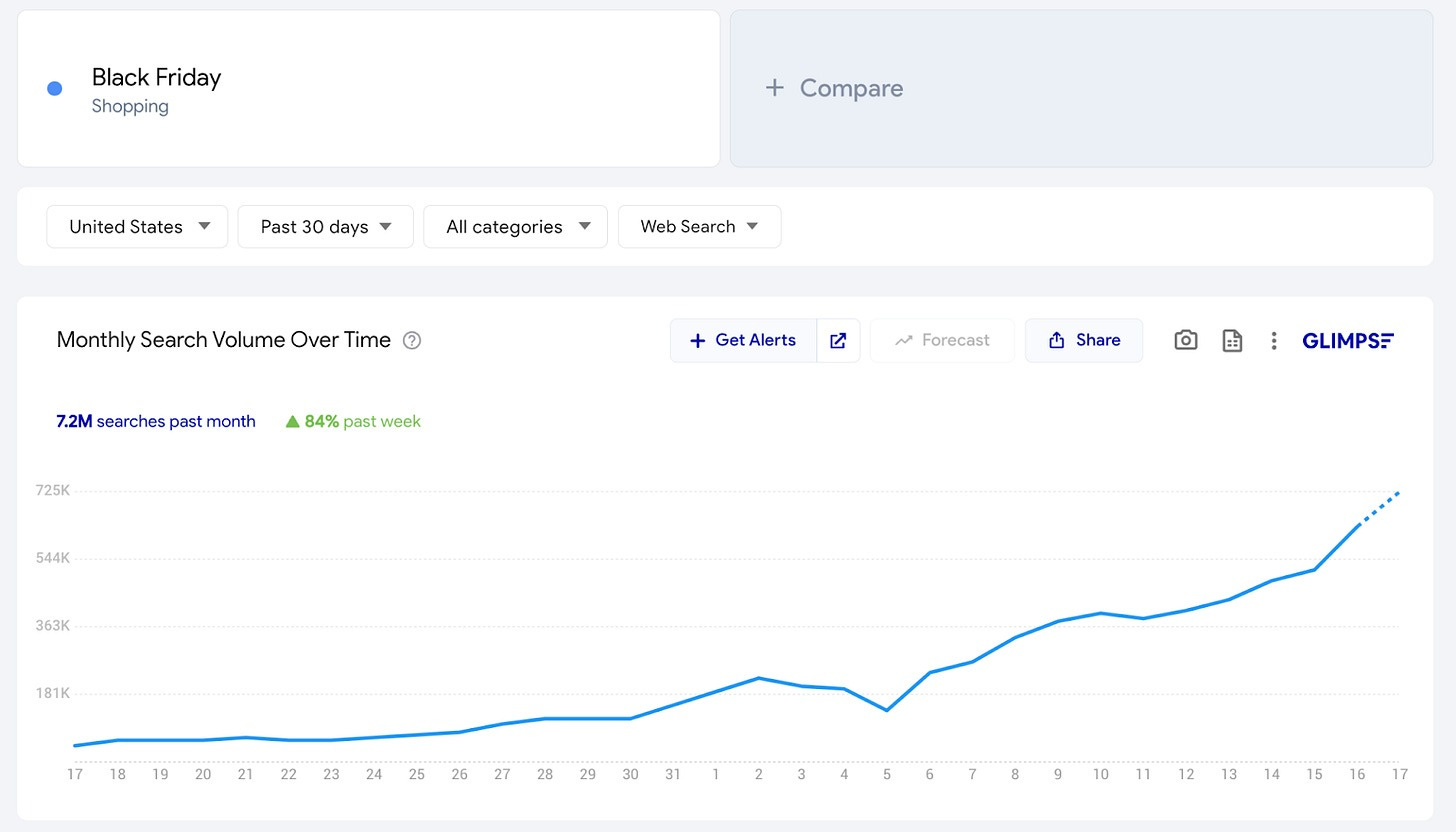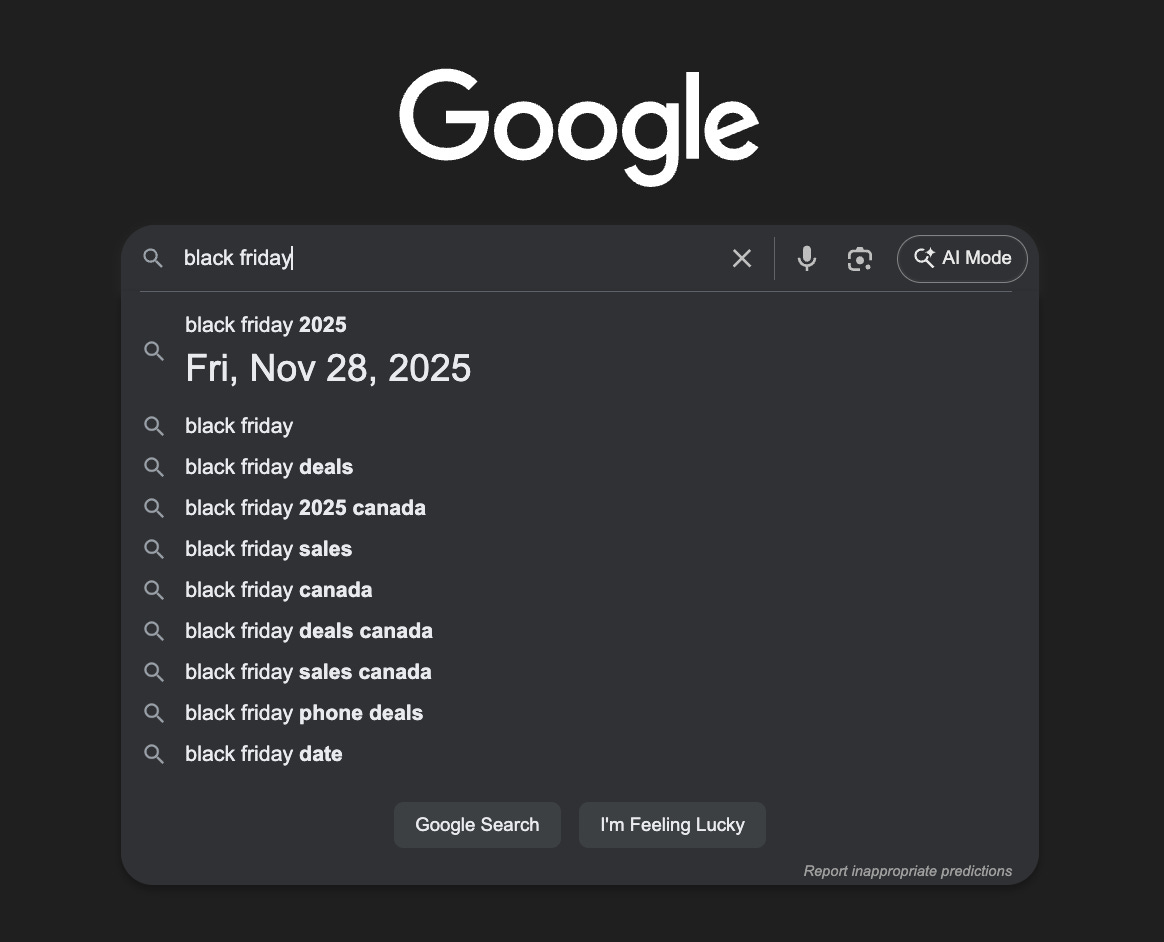9 tips for Black Friday success
Millions of people will flock to search during Black Friday. Publishers with an affiliate arm will need to be vigilant, opportunistic and have a solid strategy.
Hello, and welcome back. Shelby here, reporting live from New York City! I’m over the moon to spend the next few days with my colleagues at The Athletic, planning for what can only be described as a nutty 2026 — a Winter Olympics and a North American-hosted World Cup? I may never sleep again.
This week: Nine last minute Black Friday actions to take! Despite the rise of AI in everything we do, millions of people will flock to search for products on sale. Publishers with an affiliate arm will need to be vigilant, opportunistic and have a solid strategy.
Happening soon: Join us to discuss using Google Trends to turn data into content ideas with special guest Louisa Frahm, SEO Director for ESPN! RSVP for our November 19 community call.
Let’s get it.
THE RECAP
What is affiliate marketing SEO and why is it essential for (some) publishers?
Affiliate marketing SEO is the process of optimizing content that includes referrals to sell products or services, where the publisher makes a commission off the purchase. The goal, ultimately, is for readers to click an affiliate link in your articles and buy a product.
These pages typically include roundups of the best products in a category, a one-time deal or sales during an event (like Black Friday). Affiliate SEO prioritizes commercial and transactional keywords over informational intent.
Despite the rise of AI, there are still billions of searches on Google every day, many of them transactional in intent. People often use LLMs to orient themselves before taking their intended action (i.e., purchasing an item) on search.
Black Friday and Cyber Monday are some of the biggest shopping days of the year in the U.S., so affiliate programs can be a critical revenue stream for publishers.
However, Google continues to crack down on sites with affiliate arms in 2025, and has taken manual actions against sites clearly abusing its spam policy with thin or AI-generated content. Consultant and friend of the newsletter Barry Adams recently wrote about how the bell curve of quality content is bloated with mediocre slop, and that won’t change.
Additionally, Reddit continues to be prominently visible on search, as Google struck a deal with the forum site to train its LLMs. Reddit is especially visible on product comparison queries.
Lily Ray’s affiliate advice from a 2024 appearance on Affiliate BI’s podcast rings true:
Affiliate sites should focus on more than great on-page SEO; a great user experience is essential, too;
Personal branding is a strong signal of authority (think TikTok recommendations). Encourage writers to have a solid online presence with robust bio pages that communicate their expertise;
YouTube for SEO is powerful for affiliate sites;
Social media is becoming a strong influence on how people search and discover brands (again, TikTok);
Go beyond what SEO tools say you should do, especially for content. Use your judgment and understanding of your users/readers.
Black Friday is not the time to start affiliate content. If you don’t normally provide product reviews or content that can make a commission off a purchase, don’t start now. Affiliate SEO requires a heavy emphasis on E.E.A.T, specifically “experience.” Readers (and Google) want to know your publication has first-hand experience and expertise with these products and will provide a trustworthy review.
🔗 Read more: We’ve written in-depth about what affiliate SEO is and how to set up a solid strategy if you are just starting out.
THE HOW TO
9 tips to help your Black Friday strategy
Prep for Black Friday should have started several weeks — if not months — ago. Tentpole events like Black Friday require a lot of preparation, but the week of the event is crucial.
Search interest in Black Friday over the past 30 days has been steadily climbing, and it will undoubtedly peak next week. As the event Black Friday evolves, companies are leaning into the entire week of sales — and many have already started Black Friday deals.

With Google’s increased emphasis on trust expertise for E.E.A.T signals, especially for YMYL content, it’s crucial to offer comprehensive reviews and roundups with first-hand experience. This content should cover both positive and negative aspects of the products or services, presenting an impartial recommendation.
Provide a thorough and unique perspective, not just third-party accounts. Provide something Reddit threads can’t.
Here are nine affiliate SEO tips to make the most of the busy shopping season:
1. Split your keyword research up.
When conducting Black Friday keyword research, create two buckets: non-Black Friday branded keywords and those that include Black Friday (e.g. “iphone 15 deals” versus “black friday deals”).
This helps reach people looking up event- or product- and brand-related sales. It also helps determine where to put your attention — if a specific brand or product is being searched more, that should get more attention. People are intentional about comparing prices, so helping in as many ways as possible is crucial.

2. Utilize your Black Friday topic tag page.
You should already have a Black Friday topic tag page. Add a link to the tag to your homepage, either in the navigation or somewhere easily accessible for the duration of the event. This helps Google crawl your Black Friday content, and readers to easily scan your information.
Make it easy for readers (and Google) to find this content. Mashable, for example, has the tag in their navigation already, the Strategist has a section/module prominently placed on its homepage and Wirecutter has its top early deals in the left rail.
Link to the tag page in all stories, ensure all stories are on the tag page. Internal linking is critical.
Focus on finding ways to incorporate affiliate content seamlessly into the rest of your coverage in a way that is helpful.
3. Conduct regular hourly keyword research.
Using Google Trends (and the Glimpse extension), track the main topic “Black Friday”. You can do daily keyword research. As deals (and interest) ramps up, try to conduct this research with the past hour filter on. Refresh this tab regularly.
Keep an eye on the rising related queries, updating relevant headlines with the popular keywords and writing breakout stories as warranted.
Use Google’s autocomplete on its search bar to determine what major keywords are a focus (so far) this year, specifically in your region (use a VPN if you need to look at other areas).
Use Google’s SERPs for main target keywords as an indicator of what to focus on, too. Top Stories carousels have subheads that give clues into what stories Google’s ranking systems are paying extra attention to.
For example, below, the subhead for a news box on a “black friday” search directly mentions Walmart deals and the Apple Macbook Air sale. This means we should prioritize and optimize content according to this interest.
4. Increase the update cadence of your pages.
Black Friday pages, like deals and roundups, should be updated daily up to two weeks prior to the event, if not multiple times per day (depending on the topic, brand or time of sale). Include new product information, price changes and any other pertinent information.
Every substantial update to the copy should include a change to the image, headline and timestamp to signal freshness to Google. Use your meta description/deck or the first few lines of the body copy to highlight the updates included.
On Black Friday itself (and Cyber Monday), update these pages often, likely every hour or so. Update the image, keep product price and inventory updated and easily accessible and reflect top-referring keywords in headlines.
If you’re also running a live blog, ensure the headline is consistently updated and provides relevant information throughout the day. For multi-day coverage, start a new URL every day.
5. Link all Black Friday content together.
Like mentioned above, internal linking is critical. Readers should be able to navigate between related content easily. Make sure similar pages (e.g., “black friday apple deals,” “black friday dyson deals,” “apple iphone 15 black friday deals”) are linked together.
Create a “mega post” where every Black Friday page is linked from for easy navigation.
Utilize a table of contents for big posts that include links to all of your Black Friday content. Mashable uses a table of contents on their “mega post” for all best early Black Friday deals. Wirecutter has a list of links for you to easily jump to in their “best early Black Friday deals” story.
6. Be alert to product changes — this is the news.
Tell readers when prices change, and especially when a product goes out of stock, in your content. Being on top of this shows your expertise, and readers (and Google) will appreciate the transparency. This also signals freshness.
7. Promote Black Friday content on social media.
We are permanently online. Everyone is scouring the internet for deals, both actively and passively on social media. Promote your content on social media to expand your audience.
User-generated content from Reddit, YouTube, TikTok and Instagram in Google’s SERPs has been on the rise this year, so posting on these platforms expands your visibility opportunities on Search, too.
Utilize Reddit subthreads by posting about Black Friday deals (be sure to follow the rules of each subreddit). Make use of short video content on TikTok or Instagram by updating followers on high-searched and viral products.
8. Utilize all other audience channels.
If you have the resources, create a Black Friday-specific WhatsApp group, or offer a mini course newsletter that sends up-to-date deals or alerts regularly. Mashable utilizes a newsletter to give information about Black Friday to their readers, while Wirecutter has an in-line link for a daily deals newsletter.
9. Consider where AI can help your workflow.
As publishers find innovative ways to use AI in their newsrooms, Black Friday is a good opportunity to see how the technology can work for you. AI tools can scan sites for deals and ingest it into a Slack message, or even update prices on-page. AI can also help with internal linking when there is a large influx of content like one-off product deal stories.
AI-generated content should always be reviewed by a human for accuracy. AI can get it wrong; it’s important we don’t.
The bottom line: Black Friday is the biggest shopping event in North America, and a massive day in the e-commerce/publishing world. Ensure your strategy is set and you’re utilizing every channel — and opportunity — at your disposal, on search and elsewhere across your site.
#SPONSORED - The Classifieds
Get your company in front of more than 13,500 writers, editors and digital marketers working in news and publishing. Sponsor the WTF is SEO? newsletter!
THE JOBS LIST
Audience or SEO jobs in journalism. Want to include a position for promotion? Email us.
The New York Times is hiring an Audience Editor for D.C. coverage (D.C., U.S.).
The Financial Times is hiring a Newsletter Editor (London, U.K.).
Forbes is hiring a Social Producer for B2B & Thought Leadership (Jersey City, U.S.).
The Online News Association (ONA) is hiring a Community Engagement Coordinator (Remote, U.S.).
RECOMMENDED READING
Google news and updates
🤖 Google: Defending Search users from “Parasite SEO” spam.
🤖 Barry Schwartz: Google Discover is fixing the fake AI problem.
🤖 Danny Goodwin: EU investigating Google over site reputation abuse policy.
🤖 Google: Let AI do the “hard parts” of your holiday shopping.
Even more recommended reading
⌨️ Elissa Welle: Mozilla announces an AI ‘window’ for Firefox.
🔗 Mykhailo Shcherbachov: Do backlinks work for AI assistants and AI overviews?
🔍 Emma Roth: LinkedIn is making it easier to search for people with AI.
🖊️ Ryan Law and Xibeijia Guan: What triggers AI overviews? 86 factors and 146 million SERPs analyzed.
⭐ Dena Warren: Optimizing category pages for AI visibility.
🤔 Lily Ray: GEO, AEO, LLMO: Separating fact from fiction and how to win in AI search.
📈 Aleyda Solis: Top vertical players for AI search: A trend tracker.
🍔 Nick Leroy: Is brand demand sabotaging your SEO? Or hiding your weak strategy?
💡 Chima Mmeje: Top 2026 SEO trends and predictions from industry experts.
⚙️ Gianluca Fiorelli: The architecture of authority: An 8-task workflow for engineering a high-performance content hub.
What did you think of this week’s newsletter?
(Click to leave feedback.)
Catch up: Last week’s newsletter
Have something you’d like us to discuss? Send us a note on Twitter (Jessie or Shelby) or to our email: seoforjournalism@gmail.com.
Written by Jessie Willms and Shelby Blackley











![Join our Google Trends community call [together with Trisolute]](https://substackcdn.com/image/fetch/$s_!NXzG!,w_140,h_140,c_fill,f_auto,q_auto:good,fl_progressive:steep,g_auto/https%3A%2F%2Fsubstack-post-media.s3.amazonaws.com%2Fpublic%2Fimages%2F09531e8f-68b5-4a6e-9294-243455ed15fb_5184x3456.jpeg)
Thanks for writing this, it clarifies a lot. The strategic focus on commercial keywords for affiliate SEO is insightful. As a Pilates practicioner, I often encounter product roundups and can now better grasp their data-driven intent. It's fascinating how publishers adapt their strategy.
very useful post for me, thanks so much